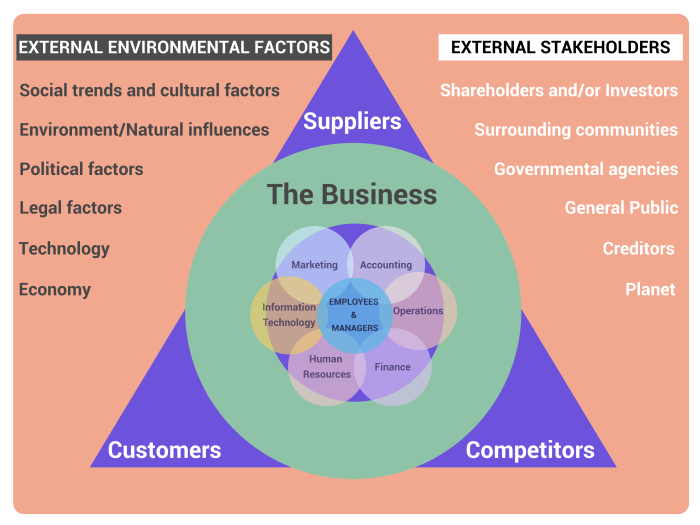
Step into the world of business where economic factors reign supreme, shaping the very foundation of the corporate landscape. From interest rates to inflation, exchange rates to economic growth, this topic delves into the heart of what drives business decisions and strategies. Get ready for a rollercoaster ride through the highs and lows of the economic landscape!
In the following paragraphs, we will explore how various economic factors play a vital role in influencing the business environment and the decisions made by companies worldwide.
Economic Factors Affecting Business Environment
Interest rates play a significant role in affecting businesses. When interest rates are low, businesses can access cheaper credit, which encourages investment and expansion. On the other hand, high-interest rates can increase borrowing costs, leading to reduced spending and investment by businesses.
Impact of Changes in Interest Rates
- Low interest rates encourage borrowing and investment in businesses, leading to economic growth.
- High-interest rates can deter businesses from borrowing, resulting in decreased investment and slower growth.
- Fluctuations in interest rates can affect consumer spending patterns, influencing businesses’ sales and revenue.
Effect of Inflation on Business Environment
- Inflation increases the cost of goods and services, impacting businesses’ production costs and pricing strategies.
- Businesses may struggle to maintain profit margins in high inflation environments, affecting their overall profitability.
- Inflation can erode consumer purchasing power, leading to changes in demand for certain products or services.
Influence of Exchange Rates on Businesses
- Fluctuations in exchange rates can impact businesses engaged in international trade by affecting the cost of imports and exports.
- A strong domestic currency can make exports more expensive, reducing competitiveness in foreign markets.
- Weaker exchange rates can benefit exporters but increase costs for businesses reliant on imported goods or materials.
Impact of Economic Growth or Recession on the Business Environment
- Economic growth can create opportunities for businesses to expand, increase sales, and invest in new technologies or markets.
- During a recession, businesses may experience reduced consumer spending, lower demand for products or services, and increased competition.
- The overall economic climate can influence consumer confidence, affecting businesses’ performance and growth prospects.
Legal Factors Influencing Business Environment
Legal factors play a crucial role in shaping the business environment. Understanding key legal regulations is essential for businesses to operate successfully and avoid potential pitfalls.
Labor Laws Impact
Labor laws govern the relationship between employers and employees, influencing various aspects of business operations such as hiring, wages, working conditions, and termination policies. Changes in labor laws can impact businesses in several ways:
- Minimum wage regulations can increase labor costs for businesses, affecting profitability.
- Workplace safety standards may require additional investments in equipment and training to comply with regulations.
- Employment discrimination laws can impact hiring practices and diversity initiatives within organizations.
Intellectual Property Laws Impact
Intellectual property laws protect the creations and innovations of businesses, including patents, trademarks, and copyrights. These laws have a significant impact on business operations:
- Protecting intellectual property rights ensures that businesses can benefit from their innovations and creations without fear of infringement.
- Enforcing intellectual property laws can prevent competitors from copying or imitating products, giving businesses a competitive advantage in the market.
- Intellectual property laws encourage innovation and investment in research and development by providing legal protection for new ideas.
Consumer Protection Laws Impact
Consumer protection laws are designed to safeguard consumers’ rights and ensure fair business practices. These laws influence business operations in various ways:
- Regulations on product labeling and advertising can impact marketing strategies and communication with consumers.
- Consumer protection laws require businesses to maintain product quality standards and provide accurate information to consumers.
- Legal requirements for refunds, warranties, and dispute resolution processes can affect customer service policies and procedures within businesses.
Technological Factors Shaping Business Environment

The rapid advancements in technology have significantly impacted the business environment, reshaping strategies and operations.Automation and digitalization have revolutionized the way businesses operate, increasing efficiency and productivity. Companies are now leveraging automation to streamline processes, reduce costs, and enhance customer experience. Digitalization has enabled businesses to reach a wider audience, improve communication, and optimize data management.
Impact of Automation and Digitalization on Businesses
- Automation has led to increased operational efficiency, reduced errors, and improved quality control.
- Digitalization has facilitated the shift towards online platforms, enhancing customer engagement and sales opportunities.
- Businesses are now able to collect and analyze vast amounts of data to make informed decisions and personalize offerings.
Cybersecurity Concerns Influence on Business Environment
- Cybersecurity threats pose a significant risk to businesses, leading to data breaches, financial losses, and reputational damage.
- Companies are investing in robust cybersecurity measures to protect sensitive information, secure transactions, and maintain trust with customers.
- Ensuring data privacy and compliance with regulations has become a top priority for businesses in the digital age.
Emerging Technologies Transforming Business Operations
- Artificial Intelligence (AI) is revolutionizing customer service, predictive analytics, and decision-making processes.
- Internet of Things (IoT) is enabling real-time monitoring, remote operations, and data-driven insights for businesses.
- Blockchain technology is enhancing transparency, security, and efficiency in supply chain management and financial transactions.
Social Factors Impacting Business Environment
The social factors impacting the business environment play a crucial role in shaping consumer behavior, cultural trends, corporate social responsibility practices, and lifestyle preferences.
Changing Demographics and Consumer Behavior
Changing demographics, such as age, gender, income levels, and family structure, have a significant impact on consumer behavior. For example, an aging population may lead to a higher demand for healthcare services and products tailored to older individuals.
Impact of Cultural Trends on Businesses
Cultural trends can greatly influence businesses in terms of marketing strategies, product development, and customer engagement. Understanding and adapting to cultural shifts can help businesses resonate with their target audience and stay relevant in the market.
Corporate Social Responsibility Practices
Corporate social responsibility practices are becoming increasingly important for businesses as consumers are more conscious of ethical and sustainable business practices. Companies that prioritize CSR initiatives can enhance their brand reputation and attract socially responsible consumers.
Shifts in Lifestyle Preferences and Business Strategies
Changes in lifestyle preferences, such as a growing focus on health and wellness, convenience, or environmental sustainability, can impact business strategies. Businesses need to adapt their products and services to align with evolving lifestyle trends to meet consumer demands effectively.
Environmental Factors Influencing Business Environment
Environmental factors play a crucial role in shaping the business environment. From climate change regulations to sustainability practices, businesses need to adapt to stay relevant in today’s world.Climate Change Regulations Impact on Businesses:Climate change regulations have a significant impact on businesses across various industries. These regulations often require businesses to reduce their carbon footprint, adopt cleaner technologies, or implement sustainable practices.
Failure to comply with these regulations can result in fines, penalties, or even legal action, affecting a company’s reputation and bottom line.Importance of Sustainability Practices:Sustainability practices are essential for businesses to minimize their environmental impact and ensure long-term viability. Implementing sustainable initiatives such as reducing waste, conserving energy, and sourcing ethically can not only benefit the environment but also attract environmentally conscious consumers and investors.
Companies that prioritize sustainability are more likely to build trust with stakeholders and create a positive brand image.Environmental Awareness and Consumer Preferences:Consumers are increasingly becoming more environmentally conscious and are choosing products and services from companies that align with their values. Businesses that demonstrate a commitment to environmental responsibility through eco-friendly products, packaging, and practices are more likely to attract and retain customers.
As environmental awareness continues to grow, it is essential for businesses to adapt and meet the changing demands of consumers.Impact of Natural Disasters on Businesses:Natural disasters such as hurricanes, earthquakes, and floods can have devastating effects on businesses, causing supply chain disruptions, property damage, and financial losses. Companies need to have robust disaster preparedness plans in place to mitigate risks and ensure business continuity.
Investing in disaster recovery strategies, insurance coverage, and resilient infrastructure can help businesses recover more quickly and minimize the impact of natural disasters.
BUSINESS ENVIRONMENT
Business environment refers to the external factors that affect the operation and success of a business. It includes all the conditions, circumstances, and influences that surround and impact a business, both positively and negatively.
A conducive business environment is crucial for the growth and sustainability of a business. It provides opportunities for expansion, innovation, and profitability. A favorable business environment fosters economic stability, promotes investment, and encourages entrepreneurship.
Factors Shaping the Business Environment
The overall business environment is shaped by a combination of internal and external factors. These factors can have a significant impact on the operations and performance of a business.
- Political Factors: Government policies, regulations, and stability can greatly influence the business environment.
- Economic Factors: Economic conditions, such as inflation, exchange rates, and economic growth, play a crucial role in shaping the business environment.
- Social Factors: Demographic trends, cultural norms, and social values impact consumer behavior and market demand.
- Technological Factors: Advances in technology, digitalization, and innovation can transform industries and create new opportunities for businesses.
- Legal Factors: Laws, regulations, and legal frameworks determine the operating environment for businesses and affect their compliance requirements.
- Environmental Factors: Sustainability, climate change, and environmental regulations are increasingly shaping the business environment and driving companies to adopt eco-friendly practices.
Competitive Advantage through a Favorable Business Environment
A favorable business environment can lead to a competitive advantage for businesses. By operating in a supportive and conducive environment, companies can enhance their productivity, attract top talent, foster innovation, and build strong relationships with customers and stakeholders. This competitive advantage enables businesses to outperform their competitors and achieve long-term success.
Conclusive Thoughts

As we wrap up our exploration of economic factors affecting the business environment, one thing is clear – the economy is a dynamic force that businesses must navigate carefully to thrive. By understanding these key factors, companies can better position themselves in the ever-changing market landscape and drive success in the long run.
Common Queries
How do economic factors like interest rates impact businesses?
Changes in interest rates can affect borrowing costs for businesses, influencing their investment decisions and overall financial health.
What is the significance of inflation in the business environment?
Inflation can erode purchasing power, leading to increased costs for businesses and impacting consumer behavior.
How do exchange rates impact businesses?
Fluctuations in exchange rates can affect international trade, profitability, and competitiveness for businesses operating in global markets.
How does economic growth or recession influence the business environment?
Economic growth can create opportunities for businesses to expand, while recessions can lead to decreased consumer spending and market uncertainty.



